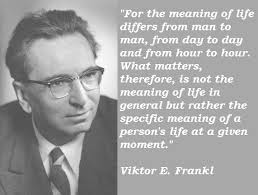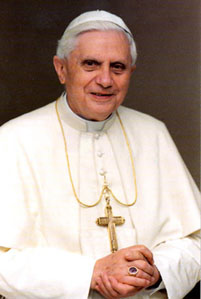“Everything can be taken from a man but one thing: the last of the human freedoms—to choose one’s attitude in any given set of circumstances, to choose one’s own way.”
- Viktor Frankl, Man's Search for MeaningReading Section 37 of 'Spe Salvi' prompted me to compare the attitude of Vietnamese Martyr Paul-Le-Bao- Tinh with that of Viktor Frankl , the founder of Logotherapy, "the Third Viennese School of Psychotherapy", while they were in the Concentration camps/ prison which can be equated to Hell! Frankl was thrown into a Nazi camp in 1942, and he managed to survive by his will to life, the will to the meaning of life.
.
 http://freudsbutcher.com/psychology/viktor-kornmehl-viktor-frankl-sigmund-freud/
http://freudsbutcher.com/psychology/viktor-kornmehl-viktor-frankl-sigmund-freud/What Frankl concluded after enduring the horrifying suffering in the camps, even in that most absurd, painful and dehumanized situation, was that life has the potential for meaning .The concept that suffering has meaning became the strong basis for his Logo therapy . He has said, "What is to give light must endure burning."
It was in the midst of the gruesome suffering he had to endure in the Nazi camp, that he suddenly had his epiphany , the revelation that if there is meaning for life, then there must be meaning for suffering too.This thought later developed into his seminal work,'Man's Search for Meaning'. In this book he describes that moment thus :
'We stumbled on in the darkness, over big stones and through large puddles, along the one road running through the camp. The accompanying guards kept shouting at us and driving us with the butts of their rifles. Anyone with very sore feet supported himself on his neighbor's arm. Hardly a word was spoken; the icy wind did not encourage talk. Hiding his hand behind his upturned collar, the man marching next to me whispered suddenly: "If our wives could see us now! I do hope they are better off in their camps and don't know what is happening to us."
That brought thoughts of my own wife to mind. And as we stumbled on for miles, slipping on icy spots, supporting each other time and again, dragging one another on and upward, nothing was said, but we both knew: each of us was thinking of his wife. Occasionally I looked at the sky, where the stars were fading and the pink light of the morning was beginning to spread behind a dark bank of clouds. But my mind clung to my wife's image, imagining it with an uncanny acuteness. I heard her answering me, saw her smile, her frank and encouraging look. Real or not, her look then was more luminous than the sun which was beginning to rise.
A thought transfixed me: for the first time in my life I saw the truth as it is set into song by so many poets, proclaimed as the final wisdom by so many thinkers. The truth--that love is the ultimate and the highest goal to which man can aspire. Then I grasped the meaning of the greatest secret that human poetry and human thought and belief have to impart: The salvation of man is through love and in love. I understood how a man who has nothing left in this world may still know bliss, be it only for a brief moment, in the contemplation of his beloved. In a position of utter desolation, when a man cannot express himself in positive action, when his only achievement may consist in enduring his sufferings in the right way--an honorable way--in such a position man can, through loving contemplation of the image he carries of his beloved, achieve fulfillment.
For the first time in my life, I was able to understand the words, "The angels are lost in perpetual contemplation of an infinite glory." In front of me a man stumbled and those following him fell on top of him. The guard rushed over and used his whip on them all. Thus my thoughts were interrupted for a few minutes. But soon my soul found its way back from the prisoners existence to another world, and I resumed talk with my loved one: I asked her questions, and she answered; she questioned me in return, and I answered... My mind still clung to the image of my wife.
A thought crossed my mind: I didn't even know if she were still alive, and I had no means of finding out (during all my prison life there was no outgoing or incoming mail); but at that moment it ceased to matter. There was no need to know; nothing could touch the strength of my love, and the thoughts of my beloved. Had I known then that my wife was dead, I think that I still would have given myself, undisturbed by that knowledge, to the contemplation of that image, and that my mental conversation with her would have been just as vivid and just as satisfying. "Set me like a seal upon thy heart, love is as strong as death." from 'Man's Search for Meaning.'

Now let us compare this with the 37th section of Spe Salvi. What I find here is a step above Frankl. More than a will to meaning, here is the will to Hope!!! Not just the ordinary terrestrial level of Hope. Here is the ultimate level, that of "finding meaning in union with Christ"!!! This is what St.Paul repeatedly says in his epistles, especially in Hebrews 11 or in the classical verse, Romans 5:5: "This Hope does not disappoint us." Let me quote Section 37 of Spe Salvi here:
37. Let us return to our topic. We can try to limit suffering, to fight against it, but we cannot eliminate it. It is when we attempt to avoid suffering by withdrawing from anything that might involve hurt, when we try to spare ourselves the effort and pain of pursuing truth, love, and goodness, that we drift into a life of emptiness, in which there may be almost no pain, but the dark sensation of meaninglessness and abandonment is all the greater. It is not by sidestepping or fleeing from suffering that we are healed, but rather by our capacity for accepting it, maturing through it and finding meaning through union with Christ, who suffered with infinite love. In this context, I would like to quote a passage from a letter written by the Vietnamese martyr Paul Le-Bao-Tinh († 1857) which illustrates this transformation of suffering through the power of hope springing from faith. “I, Paul, in chains for the name of Christ, wish to relate to you the trials besetting me daily, in order that you may be inflamed with love for God and join with me in his praises, for his mercy is for ever (Ps136 [135]). The prison here is a true image of everlasting Hell: to cruel tortures of every kind—shackles, iron chains, manacles—are added hatred, vengeance, calumnies, obscene speech, quarrels, evil acts, swearing, curses, as well as anguish and grief. But the God who once freed the three children from the fiery furnace is with me always; he has delivered me from these tribulations and made them sweet, for his mercy is for ever. In the midst of these torments, which usually terrify others, I am, by the grace of God, full of joy and gladness, because I am not alone —Christ is with me ... How am I to bear with the spectacle, as each day I see emperors, mandarins, and their retinue blaspheming your holy name, O Lord, who are enthroned above the Cherubim and Seraphim? (cf. Ps 80:1 [79:2]). Behold, the pagans have trodden your Cross underfoot! Where is your glory? As I see all this, I would, in the ardent love I have for you, prefer to be torn limb from limb and to die as a witness to your love. O Lord, show your power, save me, sustain me, that in my infirmity your power may be shown and may be glorified before the nations ... Beloved brothers, as you hear all these things may you give endless thanks in joy to God, from whom every good proceeds; bless the Lord with me, for his mercy is for ever ... I write these things to you in order that your faith and mine may be united. In the midst of this storm I cast my anchor towards the throne of God, the anchor that is the lively hope in my heart”[28]. This is a letter from “Hell”. It lays bare all the horror of a concentration camp, where to the torments inflicted by tyrants upon their victims is added the outbreak of evil in the victims themselves, such that they in turn become further instruments of their persecutors' cruelty. This is indeed a letter from Hell, but it also reveals the truth of the Psalm text: “If I go up to the heavens, you are there; if I sink to the nether world, you are present there ... If I say, ‘Surely the darkness shall hide me, and night shall be my light' —for you darkness itself is not dark, and night shines as the day; darkness and light are the same” (Ps 139 [138]:8-12; cf. also Ps 23 [22]:4). Christ descended into “Hell” and is therefore close to those cast into it, transforming their darkness into light. Suffering and torment is still terrible and well- nigh unbearable. Yet the star of hope has risen—the anchor of the heart reaches the very throne of God. Instead of evil being unleashed within man, the light shines victorious: suffering—without ceasing to be suffering—becomes, despite everything, a hymn of praise.
No comments:
Post a Comment